Acting CEO of South African Tourism Themba Khumalo says people no longer want to meet on a screen.
Pandemic devastated tourism and meetings industry
“For the past two years the world has been shut down, we couldn’t meet, we couldn’t travel. We believe that the time has come for meetings to begin, for people not to relate to one another as pixels on a screen but to meet in person and to feed on one another’s energy,” said acting CEO of South African tourism Themba Khumalo at the official opening of Meetings Africa.
The flagship event of the South African National Conventions Bureau was hosted at the Sandton Convention Centre; it was cancelled last year. According to the bureau, there have been over 35 events postponed since last year.
Before Covid-19 the meetings, incentives, conferences and exhibitions (MICE) industry was estimated to be worth R853-billion and was projected to double to R1.6-trillion in 2030, said Deputy Minister of Tourism Fish Mahlalele.
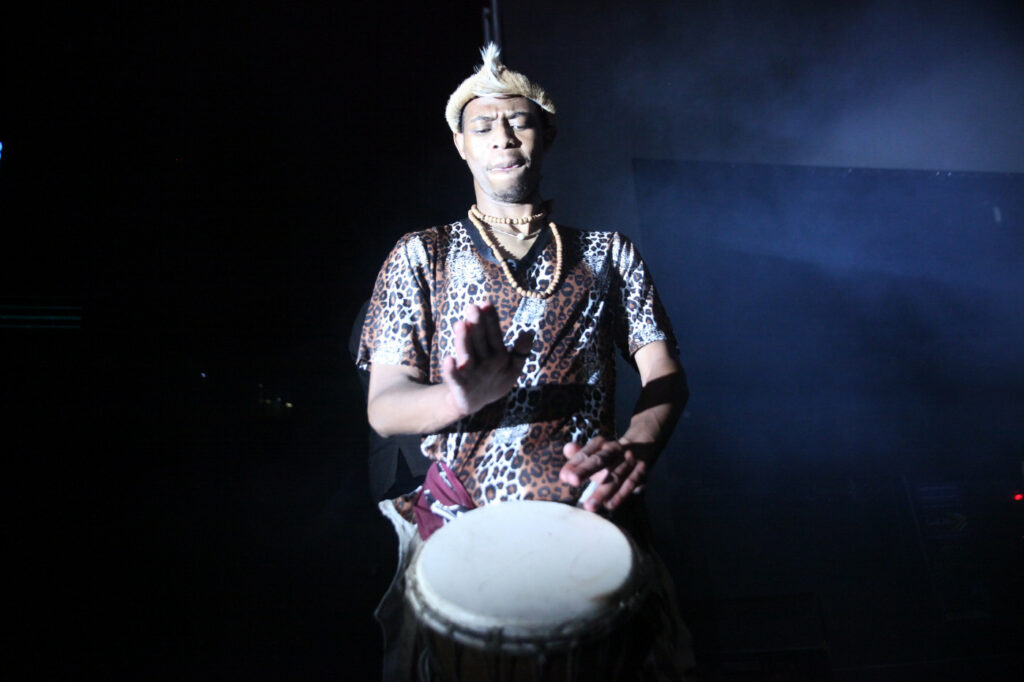 A djembe player from Drum Cafe plays at Mandela Square
A djembe player from Drum Cafe plays at Mandela Square
Business was drastically affected because there was no travel or movement, which are vital to the meetings industry. Although the tourism industry was deeply devastated by the pandemic with the introduction of lockdowns, “It was the MICE industry that was most devastated by the pandemic,” said Mahlalele. “It was devastating, but we did not sleep,” said Amanda Kotze-Nhlapo, CEO of the South African National Conventions Bureau (SANBC).
After having to cancel last year’s event, the national convention bureau went on to conduct research that would determine how they should move with this year’s meeting, given the uncertain climate at the time. The research led them to invite buyers from all over the world with an option for some of them to participate virtually, but there was a need for physical events. They went ahead because they believed that with enough preparation, they could host a meeting that would set an example that South Africa was indeed ready to welcome the world. “We are so ready, we are inviting everyone over,” added Minister of Tourism Lindiwe Sisulu in an interview.
“Opening trade corridors across the continent must also open pathways for intra-African tourism to thrive and vice versa,” said Sisulu in her opening remarks. “It is us, the African business events sector that has to be intentional and strategic in ensuring that we leverage this mutual benefit between trade and tourism,” she added.
“Resilience, industriousness, and adaptability are part of the indefatigable South African spirit. Fuelled by these qualities, and driven by an unshakable conviction that we can and must climb back to the peaks we have previously climbed with tourism in our country, we boldly announce to the world that South Africa is open and ready to welcome visitors,” said Sisulu.
Zinhle Zama, General Manager for Strategic Events at South African Tourism, said: “When we were building towards the show, what was key for us was to ensure that we offer value to our exhibitors as well as our buyers, so when we were seeing the numbers picking up of buyers and exhibitors taking up those stands, there was great excitement.”
Meetings Africa is a platform where exhibitors such as hotel groups and tourism associations from across the country and continent are represented in stands, with plenty of opportunities to meet potential buyers. Exhibitors are paired with buyers, who are international visitors with an interest and the capacity to host conferences or various meetings in different fields. The South African national convention bureau is responsible for facilitating a meeting between exhibitors and buyers, and one of the ways it does this is through a diary system, where each buyer has to have at least 20 meetings in one day with the different exhibitors.
There were 216 exhibitors and 161 buyers, which meant that there was enough room for buyers to sample all products and find what they are looking for, and for exhibitors to sell to enough buyers. Kotze-Nhlapo said they have confirmed about 4 000 meetings through their diary system — with a capacity of 1 000 people hosted at the Sandton Convention Centre. Some of the exhibitors included Tsogo Sun, Mauritius Tourism, Minor Hotel Group, Eastern Cape Parks and Tourism Authority and Mpumalanga Convention Bureau.
The National Convention Bureau has also been working on one of their projects to recover the industry, which includes working with 27 small towns, three from each province, and has identified 50 national associations in different fields, from a bees association to engineering, science and technology. It has helped the associations identify meetings or conferences that they can host in South Africa so that they could help them put together bids to win the meetings and bring business home. This initiative started with creating a database of quality assured service — with the help of the grading council — that ensures the meetings are delivered to the best standards.
Although the industry took a hard knock, “our target market of having 21-million visitors by 2030 has not changed”, said Kotze-Nhlapo when asked if she was confident the industry could bounce back.
After Meetings Africa, the convention bureau has channels of keeping in touch to ensure it “find ways of reaching out to buyers, and understanding what their needs are so we can prepare our bids and facilities in response to their needs”.
One of the popular programmes at Meetings Africa was the BONDay educational session and the Africa Business Tourism & MICE Master class, in which industries took the stage to share insights about pitching meetings and creating more business opportunities. One of the speakers was author of Business Events and director at MICE Knowledge, Dr Rob Davidson, who shared some insights from meetings in Europe.
In his talk, he said: “There was a lot of attendance of students from all over South Africa; young men and women planning careers in the MICE industry. For me, that’s very heartening. It’s a reminder for me coming from Europe to South Africa for the first time in three years just what a wonderful destination this is, and even in that time, despite everything that’s been going on, new developments and wonderful venues are opening their doors, which is another jewel in your crown.”
Lessons learnt from the pandemic
The most prominent lesson learnt from the pandemic for the tourism industry is the importance of domestic travel in sustaining the industry. “Local is lekker” offers an opportunity for the tourism industry to sustain itself. “The industry needs to rely on the movement of locals as the core of its business,” explained Mahlalele. Having a robust local tourism industry also means that we have excellent pre-existing ecosystems of services and providers who will make hosting other countries over meetings and conferences much easier.
The tourism industry is fragile, and the realisation of this by many in the sector was made apparent by how everyone was quick to get their hands on deck to help build back the industry. Sisulu said that she was amazed by the support she continues to receive from the industry, as many continue to find ways to improve and build back the tourism industry.
Safety is still a concern when it comes to South Africa’s reputation in the international market. The minister said the department of tourism is working with various other departments, including the police and tour guides, to be able to guarantee better safety for tourists. One of the ways they are thinking of doing this is introducing a safety certificate that would be expected from tour guides when hosting visitors. — Welcome Mandla Lishivha
——————————————————————————————————————————————————————————————–
The meetings industry can revolutionise trade on the continent
There was a strong sense of the continent coming together, especially in light of the intra-trade agreement, that between the 55 countries and a population of 1.6-billion, Africa has the capacity for business opportunities that could help sustain itself. Although exhibition stands in Meetings Africa were mostly showcasing South African products, there were also many from other African countries such as Mozambique, Mauritius, Botswana, Lesotho, Zimbabwe and Uganda, and there were buyers from many other countries, including India.
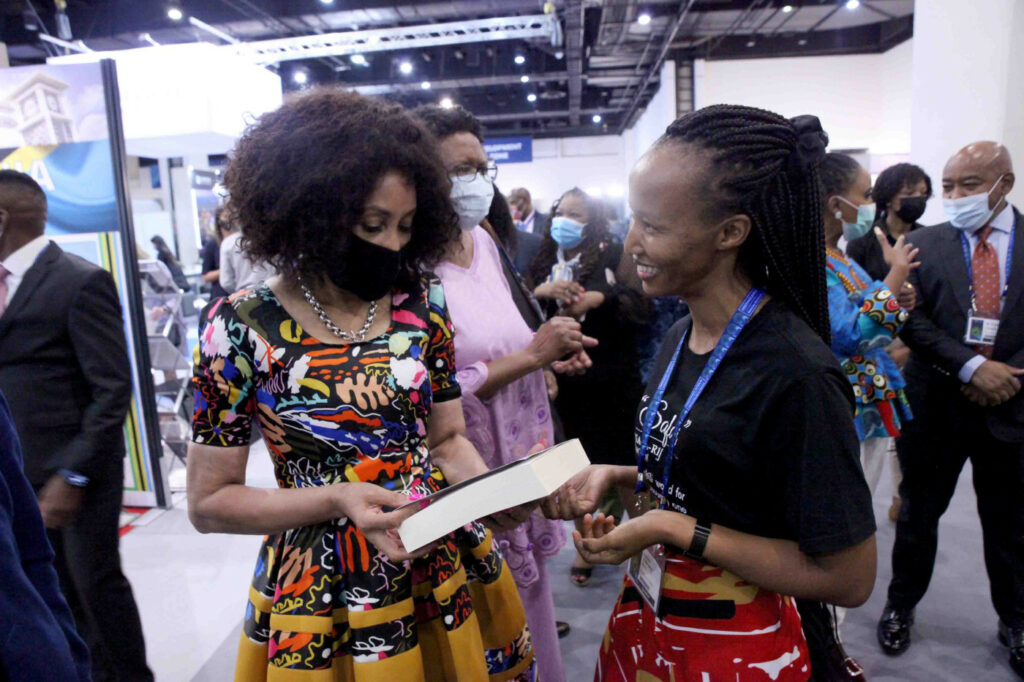 Minister of Tourism Lindiwe Sisulu meets Boipelo Tladinyani Hlubi, author of A Safari Back to Self: Backpacking Through 54 African Countries
Minister of Tourism Lindiwe Sisulu meets Boipelo Tladinyani Hlubi, author of A Safari Back to Self: Backpacking Through 54 African Countries
The African Continental Free Trade Area (AfCFTA) inspired many discussions about the future of the meetings industry on the continent. The trade agreement allows for vast opportunities that allow Africa to make the most of its resources, including human resources, to ease access and increase economic participation within the region. There is also a need to establish and grow alliances, associations and convention bureaus that will help create an African network for hosting meetings and conferences.
The market has the potential for huge growth in Africa, said the International Congress of Conventions Associations (ICCA), which has over 350 members internationally and only 14 in Africa. There is scope for finding out how Africans are meeting and what meeting facilities they each have to offer each other and the rest of the world. Conventions are ways for various industries to get together to find solutions through what is called the knowledge economy. They function largely to help solve problems, network and generate more business.
“Africa can sustain itself. This has been an eye-opener for me,” said Minister of Tourism Lindiwe Sisulu on AfCFTA. Boipelo Tladinyani Hlubi, author of A Safari Back to Self: Backpacking Through 54 African Countries, said that although most of the roads she traversed during her inland trip through 54 of 55 states in Africa were in bad condition, “what stayed with me is that we have routes connecting all inland countries, routes that if improved, could benefit intra-Africa trade, which is already taking place informally and extensively on the continent”.
How to bid and win meetings
Those wondering how to pitch meetings and conferences to host must seriously consider reaching out to the national conventions bureau. “Bring your lead to us and we can help you convert that lead by helping you bid well. We want to help you win the meeting,” said Amanda Kotze-Nhlapo, CEO of the South African National Conventions Bureau (SANBC).
Out of the 66 bids that SANBC submitted last year, they have already won 20 of those bids. Some of these meetings go on to 2027. These events are said to generate up to R269-million.
“Someone could be sitting in Atlanta studying engineering today and might not know they are coming to South Africa, but we already know, because we won the meeting. That’s why I am optimistic about this industry; we are a long-term focused market,” said Kotze-Nhlapo.
The recovery plan will first focus on the recovery of the domestic and regional markets. “It is not about competition, it is about cooperation,” said Kotze-Nhalpo. The process of countries bidding against one another to host international events presents opportunities for collaborations as countries have much to learn from each, she said. “We can help build that knowledge economy on this continent.”
The goal for the SANBC, which is celebrating its 10th anniversary this year, is to be able to assist provinces to have a seamless process when hosting international events and conferences. “I think that will be a real milestone for us, to get an equal spread of business to all provinces,” said Kotze-Nhlapo. The bureau has already hosted events in Phokeng in North West, Upington in Northern Cape and Gariep Dam in the Free State since the pandemic.
To those looking to pitch conferences or meetings, Kotze-Nhalpo suggested: “Join various associations and be part of them to have the latest updates on the developments in your field. Sign up for relevant newsletters and databases so that you can get the right information and equip yourself with knowledge about the industry,” she adds.
“Don’t be afraid to pick up the phone and call to find out if they are fixed on dates. They could say no, but do ask if you have to,” said Justin Cohen, author of Pitch to Win, who emphasised the need to make pitching a two-way stream by always tuning in to what clients really want for their event before jumping to conclusions.
Find a way to take advantage of hybrid events. While we value physical events more, there is always value in having the option to incorporate various aspects of an event, and the combination of physical events with virtual meetings offer the best of both worlds without taking from either — and an excellent pitch should include this consideration or possibility. The hybrid model also works well as a contingency plan.
“Forget luxury and focus on how visitors can expect to make a difference in the area they are visiting. Since the pandemic, we know that people have lost livelihoods, and so advertising opulence can appear to be bad taste in such an environment. Emphasis corporate social responsibility and make an impact,” added Cohen.
Travellers know that the pandemic had an effect on the communities they are visiting and are keen to leave those communities better than they found them, with the assistance of the tour guides. So always include the meaningful impact of your event, or what your venue can offer when pitching to host a conference or meeting. — Welcome Mandla Lishivha
——————————————————————————————————————————————————————————————–
Glimmers of hope for the future of meetings
Despite the devastating impact of the pandemic on many businesses and livelihoods, South Africa still has a lot going on for itself when it comes to tourism offerings. Our climate makes us an excellent destination of choice for travel. “The winter period in Europe is not comfortable for Europeans themselves,” joked Fish Mahlalele, Deputy Minister of Tourism, who went on to say “we need to intensify our marketing strategy to make sure that we can better sell South Africa to the world.” This sentiment was also echoed by Justin Cohen, author of Pitch to Win, when he said, “Africa is beautiful but it doesn’t mean they will come, and so we have to pitch Africa” in his presentation during the BONDay sessions.
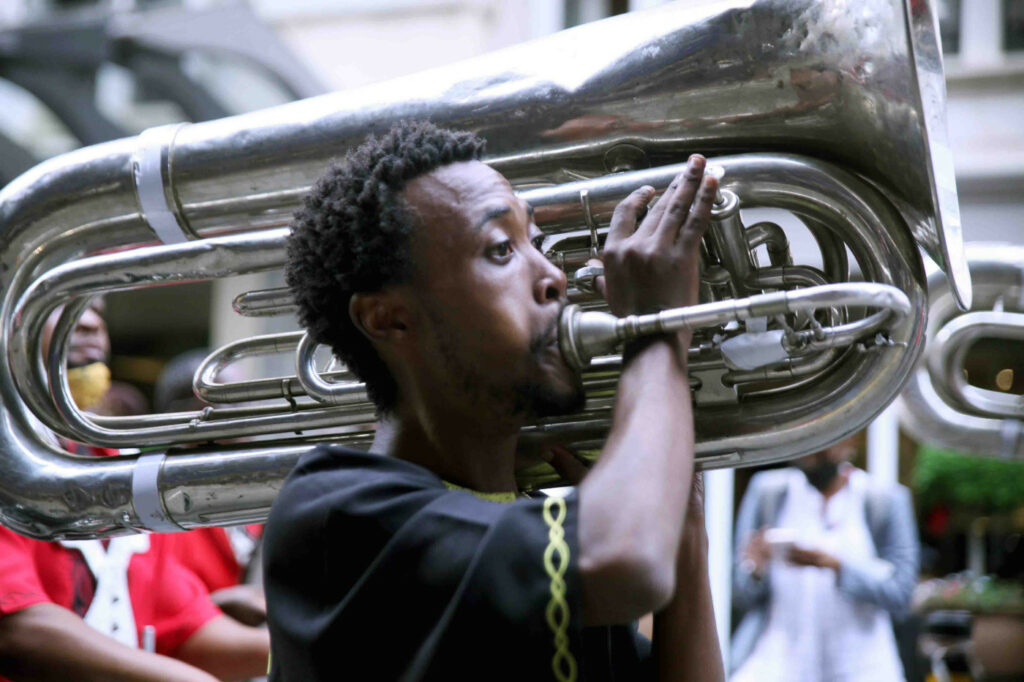 A tuba player from the Field Band Foundation welcomes the crowd at Meetings Africa
A tuba player from the Field Band Foundation welcomes the crowd at Meetings Africa
“The tourism industry is resilient because people will always need to travel, and luckily in South Africa, we have everything— our climate, food, our culture, history and heritage — travellers need to have a wonderful holiday,” said Manamela. The resilience of the industry lies in the fact that people will almost always want a reprieve from their everyday lives, especially given the high levels of mental health challenges that have been reported in the past few months.
South Africa is positioning itself as the number one destination for holiday and business travel. The various initiatives between South African Tourism, the South African National Conventions Bureau (SANBC) and various other tourism associations and authorities are aimed at offering tourists a place to rejuvenate mind, body and soul, and indeed our climate, food and beautiful landscapes might just grow in popularity with the right marketing plan in place. It was during the lockdown that the Kruger National Park was listed as one of the most searched-for national parks in the world on TikTok.
The PCR test might be done away with soon. The minister acknowledged that PCR was cumbersome, costly and took time to deliver results . When she went to visit Spain as part of the World Tourism Organization (UNWTO) conference, she had experienced a Covid-19 scanner that could tell whether you had Covid-19 or not by the time you had passed to the other side. She said they were working closely with the Council for Scientific and Industrial Research and the Department of Health to find less cumbersome ways of testing for Covid-19 to ease the limitations of having to wait hours as one does with the PCR test, which is also costly.
Since the discovery of the Omicron virus, South Africa was unfairly placed on red list, which the minister says was prejudicial, because we were the first to discover the variant wasn’t only exclusive to us. The minister is confident the days of South Africa being red-listed are well behind us. “We have convinced many of those countries of this fact, and none of them would dare red-list us now.”
Since South African tourism discovered that local travel is the way to go, they have been on a serious mission to encourage South Africans to travel. “Explore your own country — this is how we protect jobs and sustain the industry,” said Mahlalele. “We know that South Africans travel a lot, mostly to visit family and friends and attend weddings and funerals. But we are saying that when you travel and you can afford to, take a short left and explore your own country.”
When asked what ordinary South Africans can do to help build back the industry, the minister said: “Keep South Africa safe, and be part of reducing crime. Help create a safe environment, because a good country to visit grows the economy and creates jobs. The tourism industry does not belong to a select few, it can accommodate everyone — including women and youth — and it is a vital sector to our economy. Keep our streets clean, don’t litter and be hospitable.”
The Youth Development Programme is a platform that Meetings Africa established for tourism students to learn and interact with other learners and tourism industry leaders. Lerato Gengwe, a student in tourism development at the University of Johannesburg, said: “I have found the sessions very useful. They have taught me the importance and power of networking and planning”.
The sessions involved putting students into groups and assigning them various tourism-related exercises that were rated with feedback by professionals in the tourism industry. One of the exercises they had to do was plan an itinerary for a leisure trip and incorporate various elements in it. Mbali Mnguni, studying ecotourism at VUT, said that she learnt about the specifics that go into planning trips, with an emphasis on eco-tourism. “When I invite people to come to experience various destinations, I have to think carefully about how I can emphasise sustainability so they know that sustainability is at the heart of the destinations I would be recommending. This session has had me thinking about ways of communicating sustainability in ways that are also fun.”
Stands were available for small, medium and micro enterprises to showcase their products and meet buyers. The SANBC prides itself on creating opportunities for small businesses during Meetings Africa, and one of their most effective way of doing this is through the sustainability village, where small South African businesses that are BEE accredited have a chance to showcase locally produced products, most of which are recycled — promoting eco-friendly tourism while also supporting upcoming artists and entrepreneurs. Delegates were given vouchers that were redeemable for products at any of the stalls at the sustainability market.
——————————————————————————————————————————————————————————————–
The e-visa that could radically change tourism
The Department of Tourism is working on easing visa restrictions into South Africa to make travelling into the country easier by introducing an e-visa. It has already earmarked 14 countries they are working with to kick the e-visa initiative off the ground.
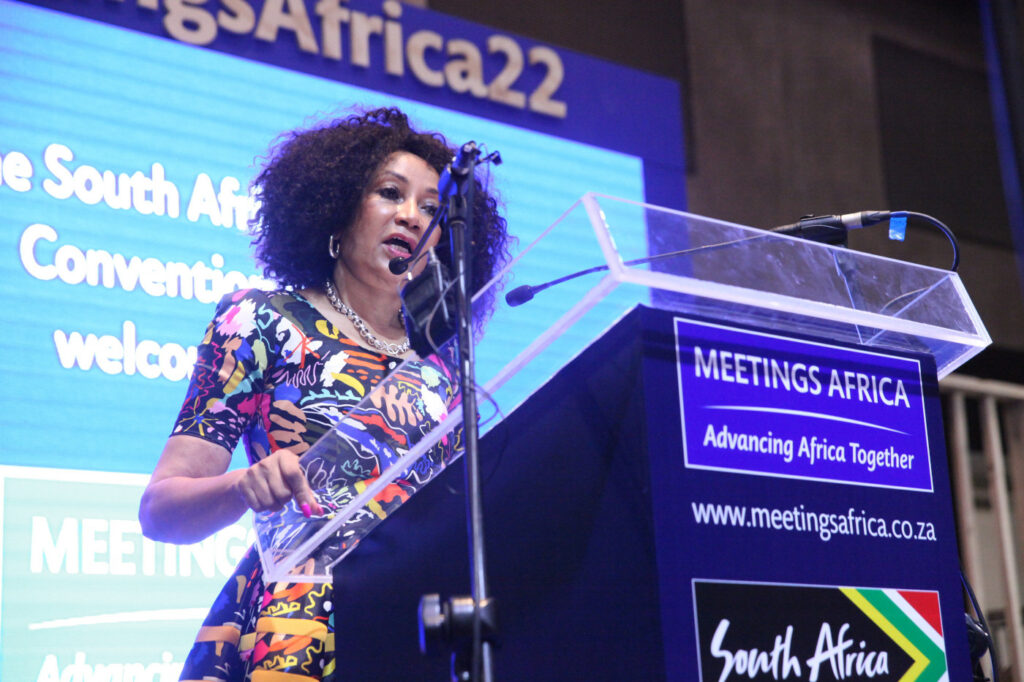 Minister of Tourism addresses delegates, audience members, buyers, sellers, conference organisers and the media at Meetings Africa.
Minister of Tourism addresses delegates, audience members, buyers, sellers, conference organisers and the media at Meetings Africa.
It has been years since there was talk about the e-visa, a point that was made by President Cyril Ramaphosa at the 2019 Africa’s Travel Indaba in Durban. However, Minister of Tourism Lindiwe Sisulu alluded to the fact that it might be ready within a few months. The 14 countries that have been identified are said to have similar identifying systems that will make it possible and easy to share technological infrastructure to make the e-visa a reality.
At the moment, visitors applying for a South African visa are required to petition for it in person, provide biometric data and hold a passport at least a month after they depart from South Africa, and visitors from more than 100 countries must obtain a visa from one of the South African diplomatic missions in order to explore our country. However, there are still over 50 nationalities that can enter South Africa without a visa for up to 90 days, and more than 25 that can enter without a visa for up to 30 days,
“We are leapfrogging into the future,” said the minister, after pointing out how time-consuming and costly the visa process is. The project is starting with 14 countries — which includes Ethiopia, China, Mexico, Kenya, Egypt, Uganda and others — with the long-term goal of inviting more with time. If this is done right, South Africa might lead a revolutionary wave of changes that help simplify visa applications throughout the world for travellers.
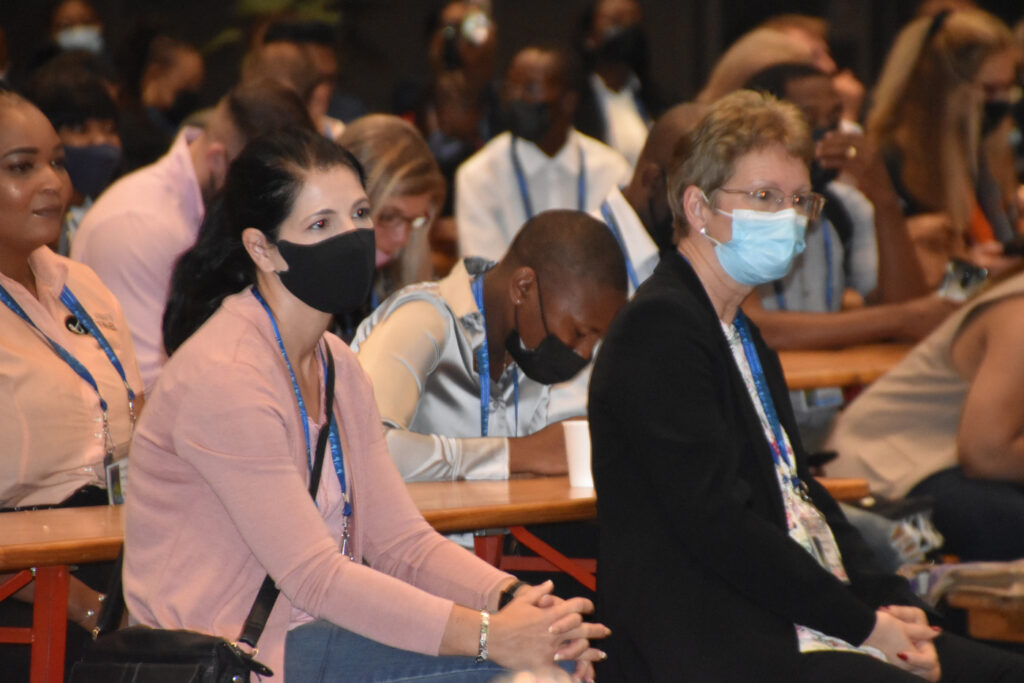 Attendees listen closely to a session conveying insights about the tourism industry in Africa
Attendees listen closely to a session conveying insights about the tourism industry in Africa
The e-visa and simplifying of travel, especially between African countries, “will benefit SMMEs as it allows freedom of movement of people and goods as well as provide market access”, according to Desire Loumou, African Continental Free Trade Agreement (AfCFTA) Trade-in-Services Officer. “Most countries still require visas to enter and depart. The African Continental Free Trade Agreement is addressing this. We have already developed the African Union passport that allows visa-free travel for Africans across the continent,” she added.
The new visa system is entirely online, which reduces waiting times and the costs involved with travelling to a South African embassy to collect the paper visa. This also has the benefit of less exposure to Covid-19. The new visa promises border checks that are quicker and more secure. At the moment, the new e-visa is planned for short-term tourists and business trips. It allows for flexibility as the quick turnaround times make it ideal for last-minute trips. — Welcome Mandla Lishivha
Travel Indaba coming up in May
Africa’s Travel Indaba is taking place in May in Durban, a further indication that the tourism sector is indeed bouncing back. Africa’s Travel Indaba is said to be one of the largest tourism marketing events on the African calendar; just like Meetings Africa, it showcases a wide variety of tourism products and attrac ts international buyers and visitors from all over the world, especially from this continent.
“We look forward to receiving the world back to KZN. We want to assure the world that we are a safe destination for travel. We have worked around the clock to ensure travellers continue to make KZN their preferred destination of choice. For the Travel Indaba, we want to remind buyers that KZN is still the destination they love and that we continue to offer everything KZN is known for — the all year good weather, and the most welcoming and hospitable people,” said Mpho Mbuli, General Manager of Marketing at KwaZulu-Natal tourism.